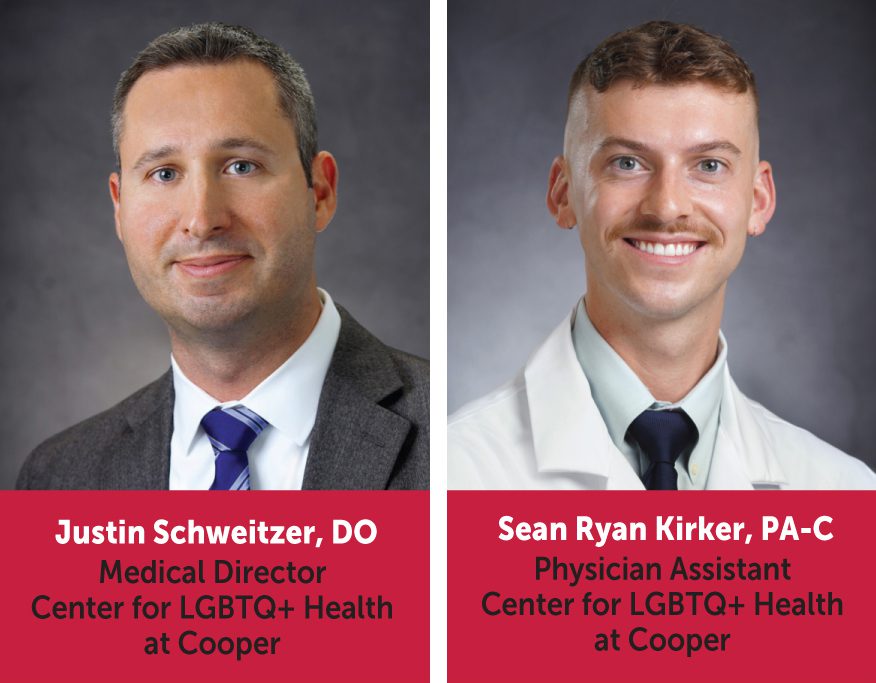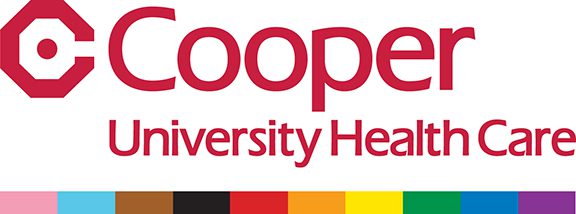Center for LGBTQ+ Health
Recognizing the many unique healthcare needs of the LGBTQ+ community, Cooper Care Alliance has opened the Center for LGBTQ+ Health, providing primary medical care, along with more specialized services, in a safe and affirming environment.
 “We’ve created a space where providers understand the specific needs of this community,” says Sean Ryan Kirker, Physician Assistant at Cooper’s Center for LGBTQ+ Health. “Many of our patients have gone to providers who don’t have experience dealing with queer-related health issues, so their needs aren’t taken seriously. That leads to healthcare avoidance and unaddressed health needs. When we have a space where patients’ health needs are validated – that’s huge.”
“We’ve created a space where providers understand the specific needs of this community,” says Sean Ryan Kirker, Physician Assistant at Cooper’s Center for LGBTQ+ Health. “Many of our patients have gone to providers who don’t have experience dealing with queer-related health issues, so their needs aren’t taken seriously. That leads to healthcare avoidance and unaddressed health needs. When we have a space where patients’ health needs are validated – that’s huge.”
One way Cooper’s Center for LGBTQ+ Health affirms the unique needs of this community is through their electronic medical records system, which allows providers to enter a patient’s pronouns and preferred name, if it is different from their legal name.
“In the trans community, if you call someone by their legal name and not their chosen name, or you use the wrong pronoun, you create a feeling of non-acceptance, so they’re less likely to come to you for any type of care, because you’re not respecting who they are,” says Justin Schweitzer, DO, Medical Director of Cooper’s LGBTQ+ Center for Health. “But with our electronic system, we’re creating an affirming space. It’s a very important and fundamental part of what we do.”
In addition to providing primary care services, the Center also offers medical services that address the specific medical needs of the community, including gender-affirming hormone therapy, PrEP for HIV prevention, early intervention care for patients who are HIV+ and surgical services for the transgender community.
“We have a comprehensive program that spans Cooper’s medical network,” says Dr. Schweitzer. “We have primary care providers, surgeons and specialists who are LGBTQ+ affirming. We offer services specific to this community, like a top surgery team, where surgeons remove breast tissue in trans men so they’re able to go out in public without a shirt. We also offer gender-affirming hysterectomy and non-estrogen contraception for trans men. Our website has a directory of our LGBTQ+ affirming providers.”
In addition to physical healthcare needs, the Center for LGBTQ+ Health also addresses mental health issues. “When dealing with gender dysphoria – or not feeling comfortable in one’s body due to the sex assigned at birth – patients can experience anxiety, depression, etc. We deal with mental health struggles pertaining to the LGBTQ+ community, as well as patients who aren’t part of this community, every day in primary care,” says Kirker.
“There is also a lot of substance abuse and addiction in this community, unfortunately,” adds Dr. Schweitzer. “Cooper’s Center for Healing provides integrated care for patients struggling with addiction, and their providers are LGBTQ+ affirming.”
“Plus, some insurance companies require a letter of support from a mental health provider for patients getting gender affirming surgery. We have providers who are able to make sure patients are mentally stable for optimal surgical outcomes to further improve their gender dysphoria. But as someone who’s been doing this work now for 4 years, honestly, providing gender-affirming care can dramatically improve someone’s mental health.”
Both Dr. Schweitzer and Kirker believe Cooper’s Center for LGBTQ+ Health has found the perfect home at Cooper. “We saw that patients were traveling outside of New Jersey to seek care. We want them to get the healthcare they need in their own backyard,” says Dr. Schweitzer.
Great care was taken to bring the program to the community, Schweitzer adds, and Cooper’s Co-CEOs, Kevin O’Dowd, JD, and Anthony Mazzarelli, MD, JD, supported this program every step of the way.
“And when it comes to diversity, equity & inclusion, Cooper has the LGBTQ+ steering committee. We look for ways to improve the health of LGBTQ+ patients in South Jersey,” adds Carman Ciervo, Chief Physician Executive, Cooper Care Alliance.
“At Cooper’s Center for LGBTQ+ Health, we strive to be a little different and inclusive, because we understand where patients are coming from,” adds Kirker. “We know you might be avoiding healthcare because your experience in that space hasn’t been affirming. People might not have believed what you were sharing. You might not have received compassion. But we believe what our patients are saying. We have compassion and empathy. To all members of the LGBTQ+ community, I would just like to say that we hear you, we see you, and we welcome you.”


